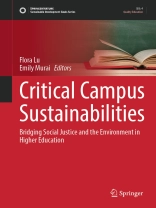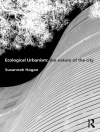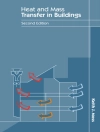In response to student demands reflecting the urgency of societal and ecological problems, universities are making a burgeoning effort to infuse environmental sustainability efforts with social justice. In this edited volume, we extend calls for higher education leaders to revamp programming, pedagogy, and research that problematically reproduce dominant techno-scientific and managerial conceptualizations of sustainability. Students, staff and community partners, especially those from historically underrepresented and marginalized groups, are at the forefront of calls for critical sustainabilities programming, education and collaborations. Their work centers themes of power relations, (in)equity, accessibility, and social (in)justice to study the interrelationships between humans, non-humans, and the environment. Their voices, perspectives and lived experiences are provocations for institutions to think and act more expansively. This book amplifies some of these voices and bottom up efforts toward a more critical approach to sustainability on campus. We ground our recommendations on findings from campus-wide surveys that were taken by over 8, 000 undergraduates in 2016, 2019, and 2022. Furthermore, we share the design principles and lessons learned from several innovative, award-winning initiatives designed to foster critical sustainabilities at UC Santa Cruz.
Jadual kandungan
Part1. Chapter1. Inclusive Sustainability: The Emergence and Vision of Po CSC.- Chapter2. Student Voices on Environmental Spaces and Experiences in Higher Education.- Chapter3. Teaching Critical Sustainability Studies: Towards a Relational Pedagogy.- Part2. UCSC Students’ Sustainability Perceptions, Understandings, and Values.- Chapter4. Student Understandings of Sustainability.- Chapter 5. The Environmental Belief Paradox.- Chapter6. Environmental Sustainability and Epidemiological Struggle: Student Experiences of COVID-19.- Chapter7. Critical Environmentalisms: Overcoming Institutional Obstacles to Meet Students’ Demands for Sustainability Curricula and Action.- Part3. Community-Engaged Critical Sustainabilities.- Chapter8. Developing a Praxis of Loving Relations: Lessons from a Community-University Partnership that Centers Undergraduate Research and Learning.- Chapter9. The Calabasas Community Garden: Sustaining Community through Meaningful Relationships.- Chapter10. Environmental Justice Youth Leadership in Salinas Valley, CA.
Mengenai Pengarang
Dr. Flora Lu is a Professor of Environmental Studies at the University of California, Santa Cruz and an ecological anthropologist specializing in conservation politics, environmental justice, political ecology and Indigenous environmental stewardship. She served as the Provost of College Nine and John R. Lewis College from 2014 – 2023, during which time she helped establish the People of Color Sustainability Collective (Po CSC) and the Apprenticeship in Community Engaged Research or (H)ACER Program. She earned her doctorate in Ecology from the University of North Carolina at Chapel Hill and her A.B. in Human Biology from Stanford University.
Dr. Emily Murai is a Lecturer in the Environmental Studies Department and College Nine at the University of California, Santa Cruz, USA. She has been teaching courses in first-year writing, writing-across-the-curriculum/writing-in-the-disciplines (WAC/WID), and the environmental humanities/social sciences for more than two decades. She emphasizes holistic teaching and learning, innovative pedagogies and centering students’ backgrounds and lived experiences in her work. She holds a Ph D in Human Geography from the University of Minnesota, an MA in Sociology from the New School for Social Research, and a BA in American Studies and Psychology from UC Santa Cruz.












